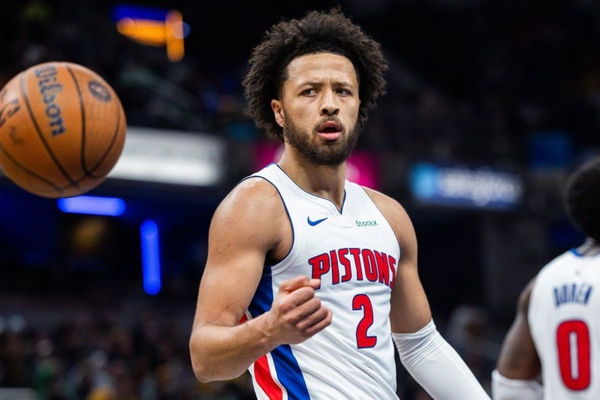
via Imago
Nov 29, 2024; Indianapolis, Indiana, USA; Detroit Pistons guard Cade Cunningham (2) celebrates a made shot in the second half against the Indiana Pacers at Gainbridge Fieldhouse. Mandatory Credit: Trevor Ruszkowski-Imagn Images

via Imago
Nov 29, 2024; Indianapolis, Indiana, USA; Detroit Pistons guard Cade Cunningham (2) celebrates a made shot in the second half against the Indiana Pacers at Gainbridge Fieldhouse. Mandatory Credit: Trevor Ruszkowski-Imagn Images
For years, the Detroit Pistons were a team in limbo—talent scattered, expectations low, and playoff hopes a distant memory. Since 2019, the franchise had struggled to find its identity, and even the first overall pick Cade Cunningham, drafted in 2021, faced an uphill battle navigating a roster full of potential but lacking structure. Early setbacks, inconsistent play, and a league-worst 14-win season painted a picture of a team searching for direction—until this season, when a shift in leadership and culture sparked a remarkable turnaround.
In a recent Tonight Show appearance with Jimmy Fallon, Cunningham discussed what shifted this season. He didn’t point to a single trade or marquee signing. Instead, the improvement came from leadership and organizational changes that provided clear expectations and a renewed focus on accountability.
Cunningham highlighted the impact of GM Trajan Langdon and head coach J.B. Bickerstaff. “I think the start of that has to be Trajan Langdon, JB Bickerstaff,” he said. “First and foremost, they came in, they brought a structure to us and just another hunger that I really think helped guide us.” He added, “We had a horrible year before they got here. Everybody, we all had a chip on our shoulder. And then we bring in two guys like that that also have a chip on their shoulder.”
ADVERTISEMENT
Article continues below this ad
Under this renewed direction, the Pistons finished the 2024-25 season with a 44-38 record, securing the 6th seed in the Eastern Conference and marking their first playoff berth in six years. The team’s offensive output rose to 115.5 points per game, while defensively, they allowed 113.6 points per game, showcasing balanced growth. Cunningham noted the tangible effects: “It just made us focus, made us push harder every day. You could see it in practice, in games—everyone was more accountable.”
Cunningham’s own performance grew alongside the team. He averaged 26.1 points and 9.1 assists per game, showing increased efficiency and leadership. His All-Star selection further highlighted his progression and the team’s rising profile in the league. Ivey and center Jalen Duren also stepped up, ahead of rookie-scale extensions for both.
The Pistons’ rise to the playoffs involved more than just improved stats and highlight-reel plays—it reflected a conscious effort to rebuild the team’s identity from the ground up. Central to this transformation were the changes in leadership and the cultural adjustments they implemented, which gave players clear expectations and a renewed hunger to compete. Understanding these shifts is key to appreciating how the Pistons became a more focused and resilient team.
ADVERTISEMENT
Article continues below this ad
Langdon and Bickerstaff Spark Detroit’s Revival
Upon taking over in 2024, Trajan Langdon and J.B. Bickerstaff implemented key changes to reshape the Detroit Pistons’ culture and roster. Langdon, appointed as president of basketball operations, prioritized building a disciplined and resilient team. He emphasized the importance of toughness and accountability, aiming to establish a new identity for the franchise.

via Imago
Nov 4, 2024; Detroit, Michigan, USA; Detroit Pistons guard Cade Cunningham (2) dribbles in the second half against the Los Angeles Lakers at Little Caesars Arena. Mandatory Credit: Rick Osentoski-Imagn Images
What’s your perspective on:
Did the Pistons' leadership overhaul finally unlock their potential, or is this just a lucky season?
Have an interesting take?
One of the most visible changes was Bickerstaff’s “hoodie rule” implementation, which prohibited players from wearing hoodies during practices and warmups. This policy was designed to promote focus and professionalism, signaling a shift toward a more structured and serious approach to preparation. Bickerstaff’s leadership style, which included passionate defense of his team’s playing style, further reinforced the new culture.
ADVERTISEMENT
Article continues below this ad
Roster-wise, the Pistons made significant moves to complement their young core. In the 2024 offseason, they signed veteran sharpshooters Malik Beasley and Tim Hardaway Jr., and secured forward Tobias Harris on a two-year deal. These additions aimed to provide scoring depth and veteran presence. Additionally, the team drafted Ron Holland II with the fifth overall pick, signaling a commitment to building for the future.
These changes, led by Langdon and Bickerstaff on and off the court, contributed to a remarkable turnaround for the Pistons, culminating in their first playoff appearance in six years. The combination of leadership, roster adjustments, and cultural shifts laid the foundation for a more competitive and cohesive team.
ADVERTISEMENT
ADVERTISEMENT
ADVERTISEMENT
ADVERTISEMENT



Did the Pistons' leadership overhaul finally unlock their potential, or is this just a lucky season?